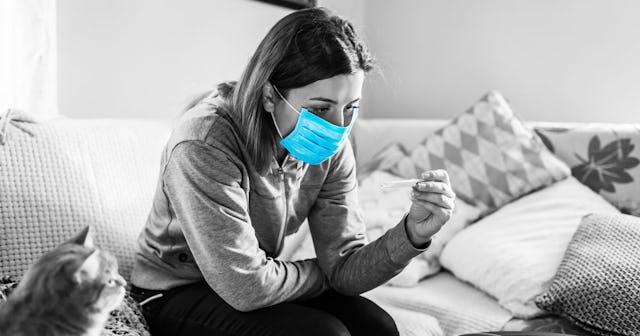Catt Sadler's Breakthrough COVID Infection Has Us Wondering — How Common Is It?

Entertainment reporter Catt Sadler had a message for her Instagram followers on July 13. She wrote, “I am fully vaccinated and I have Covid.”
“Fully vaccinated” and “have COVID” are four words most of us never want to hear or read together. And yet, more frequently than any of us would like, stories that include those words keep appearing. Often, the Delta-variant seems to be to blame.
Sadler confirmed she’d been infected with the Delta variant after taking care of an unvaccinated person who’d been infected with COVID. She warned her followers about the Delta variant, calling it “relentless,” and urged folks not to “let your guard down.”
It’s no doubt good advice, especially with half the population still unvaccinated and the Delta variant accounting for more than half of all new infections in the U.S. It’s also a reason to better understand what it means to be fully vaccinated in light of variants and waning vaccine uptake.
Breakthrough Infections Are Not Uncommon
Experts are not alarmed at reports of these breakthrough infections—infections in fully vaccinated folks as in Sadler’s case. In fact, these breakthrough cases are unfortunately expected, according to the CDC.
“COVID-19 vaccines are effective and are a critical tool to bring the pandemic under control. However, no vaccines are 100% effective at preventing illness in vaccinated people. There will be a small percentage of fully vaccinated people who still get sick, are hospitalized, or die from COVID-19,” the CDC said.
There may also be certain factors that increase the risk of developing a breakthrough infection. In Britain, breakthrough Delta infections due to COVID seem to be occurring in those who are “exposed to large amounts of the virus,” including health care workers (which could explain Sadler’s infection considering she was taking care of an infected person), bus drivers, and taxi drivers. Age and health conditions may also play a role in whether someone develops a breakthrough infection, according to Dr. Muge Cevik, an infectious disease expert at the University of St. Andrews in Scotland and a scientific adviser to the British government.
Marin County Health Officer Dr. Matt Willis told a local ABC News station that they are seeing an uptick in the number of vaccinated patients coming into the hospital—up to one in five from one in ten. But he confirmed that all the vaccinated patients are older and have underlying conditions. Importantly, he noted that they seem to be faring better than the unvaccinated patients.
The COVID-19 Vaccines Are Effective Against Delta
martin-dm/Getty
The COVID-19 vaccines are highly effective. They are absolute marvels of science, as far as I’m concerned. The fact that we can even consider “post-pandemic” life less than eighteen months after a pandemic was declared is due exclusively to the brilliance of scientists who turned their collective genius to keeping us alive.
That being said, they do seem to be slightly less effective against the Delta variant, though studies vary on exactly how much less effective. A study from Britain found that two doses of the Pfizer vaccine was 88 percent effective at protecting against symptomatic disease caused by Delta, down from about 95 percent. A study in Scotland found that the vaccine was 79 percent, while a study in Israel concluded that the vaccine’s effectiveness had dropped to 64 percent against Delta.
Obviously, that’s not news we want to hear. However, more important (and more positive) is the fact that the vaccines are still stunningly good at preventing death and severe hospitalization. Only 0.00003% of fully vaccinated people have required hospitalization, according to the CDC.
Naor Bar-Zeev, an associate professor at the Johns Hopkins Bloomberg School of Public Health, confirmed as much to the New York Times. He said, with respect to the vaccines, that “[t]heir overall implications are consistent: that protection against severe disease remains very high.”
The takeaway is clear—vaccines will keep you safe from severe disease and death. Even against Delta.
Breakthrough Infections Generally Have Mild Symptoms
In most cases, if you’re infected after vaccination, you will be asymptomatic or develop mild symptoms. Dr. Soumya Swaminathan, the World Health Organization’s chief scientist, confirmed as much, saying. “The majority of these [breakthrough infections] are mild or asymptomatic infections.”
Unfortunately, that’s not always the case. Catt Sadler wrote that her symptoms were not mild. She reported two days of fever, headache, congestion, terrible fatigue, and “some weird pus coming out of my eye.”
Despite those alarming symptoms, Sadler’s vaccination status likely means that she’s less likely to transmit the virus to others around her. Fauci highlighted the fact that folks with breakthrough infections have less virus in their nasopharynx and as a result are less likely to transmit the virus. Also, she’s probably not at risk for Long COVID—a syndrome in which often debilitating symptoms can exist for weeks or months after initial infection. The consensus among experts seems to be that breakthrough infections will not lead to Long COVID. (Phew!) “[T]he immune response is so quick and so robust that it basically stops the infection in its tracks,” said Angela Rasmussen, a virologist at the Vaccine and Infectious Disease Organization at the University of Saskatchewan in Canada, who spoke about breakthrough infections and Long COVID.
When discussing breakthrough infections, there’s always the risk of causing panic. Don’t panic. By and large, if you are vaccinated, you are protected from the worst of COVID. But you should stay informed and stay vigilant. When it comes to fighting COVID, the best weapon we have, other than the vaccines, is knowledge.